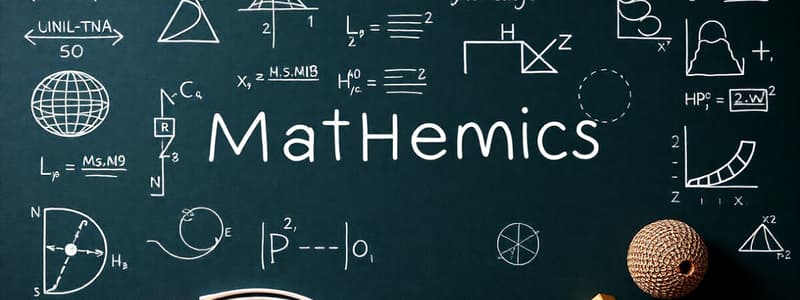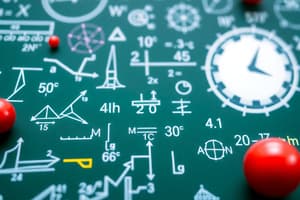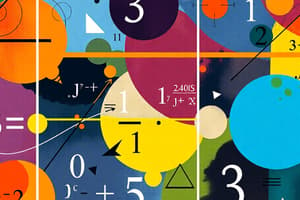Podcast
Questions and Answers
Natural numbers include negative numbers.
Natural numbers include negative numbers.
False (B)
Understanding mathematical notation is essential for comprehending mathematical expressions.
Understanding mathematical notation is essential for comprehending mathematical expressions.
True (A)
Irrational numbers can be expressed as a ratio of two integers.
Irrational numbers can be expressed as a ratio of two integers.
False (B)
Complex numbers consist of only real parts.
Complex numbers consist of only real parts.
Perseverance in problem-solving involves staying focused despite obstacles.
Perseverance in problem-solving involves staying focused despite obstacles.
Arithmetic includes advanced structures like groups and rings.
Arithmetic includes advanced structures like groups and rings.
Statistics involves collecting, organizing, analyzing, and interpreting data.
Statistics involves collecting, organizing, analyzing, and interpreting data.
Calculus is primarily concerned with the relationships between angles and sides of triangles.
Calculus is primarily concerned with the relationships between angles and sides of triangles.
Theorems are statements that are unproven in mathematics.
Theorems are statements that are unproven in mathematics.
Probability studies the certainty of events occurring.
Probability studies the certainty of events occurring.
Functions are defined as collections of objects in mathematics.
Functions are defined as collections of objects in mathematics.
Abstract Algebra examines fundamental principles like logic and proofs.
Abstract Algebra examines fundamental principles like logic and proofs.
Mathematics is used in engineering for designing and analyzing structures.
Mathematics is used in engineering for designing and analyzing structures.
Flashcards
Natural Numbers
Natural Numbers
Whole numbers greater than zero (1, 2, 3,...).
Rational Numbers
Rational Numbers
Numbers that can be expressed as a ratio of two integers (e.g., ½, 3/4).
Mathematical Modeling
Mathematical Modeling
The process of using mathematical concepts and equations to represent real-world situations.
Deductive Reasoning
Deductive Reasoning
Signup and view all the flashcards
Inductive Reasoning
Inductive Reasoning
Signup and view all the flashcards
What is arithmetic?
What is arithmetic?
Signup and view all the flashcards
What is algebra?
What is algebra?
Signup and view all the flashcards
What is geometry?
What is geometry?
Signup and view all the flashcards
What is trigonometry?
What is trigonometry?
Signup and view all the flashcards
What is statistics?
What is statistics?
Signup and view all the flashcards
What is probability?
What is probability?
Signup and view all the flashcards
What is number theory?
What is number theory?
Signup and view all the flashcards
What is abstract algebra?
What is abstract algebra?
Signup and view all the flashcards
Study Notes
Foundations of Mathematics
- Mathematics encompasses a vast array of concepts, from basic arithmetic to complex theories like calculus and abstract algebra.
- Its universality allows for the formulation and examination of patterns and relationships across disciplines.
- Mathematics is characterized by its axiomatic structure, where definitions and theorems are logically derived from a set of fundamental principles.
Branches of Mathematics
- Arithmetic: Deals with basic number operations (addition, subtraction, multiplication, division).
- Algebra: Extends arithmetic by using symbols to represent variables and solve equations.
- Geometry: Focuses on shapes, sizes, and spatial relationships.
- Calculus: Studies change and motion, encompassing differential and integral calculus.
- Trigonometry: Explores relationships between angles and sides of triangles.
- Statistics: Involves collecting, organizing, analyzing, and interpreting data.
- Probability: Studies the likelihood of events occurring.
- Number Theory: Focuses on properties of integers.
- Abstract Algebra: Studies advanced structures like groups, rings, and fields.
Key Concepts and Principles
- Sets: Collections of objects, vital for defining mathematical structures.
- Functions: Mappings between sets, illustrating relationships.
- Logic: Precise reasoning for mathematical arguments and proofs.
- Proofs: Demonstrations of statement validity, essential for theorems.
- Axioms: Fundamental assumptions, forming the basis of systems.
- Theorems: Proven statements based on axioms.
- Postulates: Similar to axioms, assumptions for developing arguments.
Applications of Mathematics
- Science: Used for modeling and analyzing natural phenomena (e.g., physics, chemistry).
- Engineering: Crucial for designing and analyzing structures and systems.
- Computer Science: Forms the basis of algorithms, data structures, and programming.
- Finance: Used for risk assessment, investment analysis, and financial modeling.
- Social Sciences: Utilized in statistical analysis and social trend modeling.
- Business: Aids decision-making, process optimization, and predictions.
- Everyday Life: Applicable in various activities like budgeting, cooking, and measurement.
Mathematical Notation and Symbols
- Notation is vital for clear and concise communication of mathematical concepts.
- Specific symbols represent operations (e.g., +, -, ×, ÷) and mathematical objects (e.g., variables, sets, functions).
- Mastering mathematical notation is fundamental for understanding mathematical expressions.
Different Number Systems
- Natural numbers: Whole numbers greater than zero (1, 2, 3...).
- Integers: Whole numbers, including zero (-3, -2, 0, 1, 2...).
- Rational numbers: Numbers expressible as a ratio of two integers (e.g., ½, 3/4).
- Irrational numbers: Numbers not expressible as a ratio of integers (e.g., √2, π).
- Real numbers: Combination of rational and irrational numbers.
- Complex numbers: Numbers with real and imaginary parts (e.g., 2 + 3i).
Mathematical Modeling
- Creating simplified representations of real-world phenomena using mathematical concepts and equations.
- Essential for understanding and predicting complex behaviors.
- Models used for testing hypotheses, predictions, and problem solutions.
Problem-Solving Skills
- Deductive reasoning: Following logical steps from given premises.
- Inductive reasoning: Identifying patterns and generalizing from observations.
- Creative thinking: Developing innovative solutions.
- Critical thinking: Evaluating assumptions and arguments rigorously.
- Perseverance: Staying focused despite obstacles.
Studying That Suits You
Use AI to generate personalized quizzes and flashcards to suit your learning preferences.




